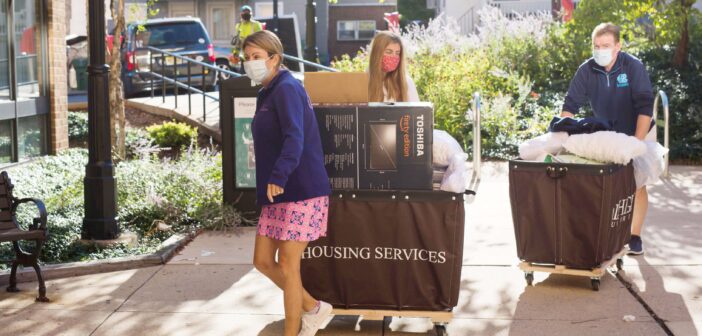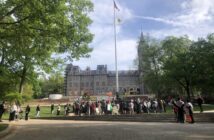Walking on a barren campus, enjoying the last supper before take-out containers, spitting into a test tube on the STEPS lawn, staring at a computer for three days of virtual orientation, sneaking into other residence buildings, standing in a socially-distanced circle outside of The Cup, hiking to the front lawn at midnight on a Friday night, being deported to Trembley. The list goes on and on.
When COVID interrupted the final breath of high school and plagued the start of college, nothing was certain for this year’s graduating class.
Less than one month before the start of school in 2020, Lehigh announced that only first-year students would be welcomed back to campus. To accommodate each room being a single, first-years were spread all throughout campus.
The year was riddled with uncertainty, unfairness and unforeseen conditions that diminished the college experience.
To put it simply, it wasn’t easy. For some, it was detrimental.
Jack McGhee, ‘25, was a first-year in 2020 and was placed in Farrington Square. During the first semester, he found it especially difficult to connect with others. His social circle was limited to around 10 people.
His experience led him to take a gap year after his sophomore year.
“I consider myself very lucky because I took that year off,” McGhee said. “I figured my s—t out, and I came back with a brand new perspective. I feel really badly for the people who started when we started (in 2020) and are finishing now.”
McGhee said he expected college to help him mature, but he left his first year disappointed.
McGhee wasn’t alone in his disappointment.
For Liz LaRue, ‘24, it wasn’t until the following year that things began to look up.
LaRue said in the first few weeks of sophomore year, even with masks on, she interacted with more people than she had in her entire first year.
“I definitely see how bad it was, especially living in the dorm,” LaRue said.
COVID policies waivered throughout the semester. Some included no visitation for anyone outside of someone’s dorm, indoor gatherings with a maximum of 10 people, plastic dividers in between dining hall seating and masks on in any shared space.
These policies, as well as surveillance testing and sick housing, were attempts to keep the campus as healthy as possible. They also came with strict enforcement.
Three days before classes started, there were already 15 COVID-related conduct cases. By late November, there were over 150 active cases of COVID reported.
“The rules were obviously limiting,” LaRue said. “But, they had to be there because (Lehigh) didn’t want everyone getting sick.”
It was up to Gryphons, about one per floor, to enforce these policies, despite facing their own troubles during this time.
Danielle Picarello, ‘22, ‘23G, was an incoming junior and first-time Gryphon in 2020. When she applied for the position in the prior year, she said she had ambitions to help guide and connect with younger students. As an undergraduate herself, she said she didn’t anticipate the policing aspect that came with the job.
“I had my own concerns about COVID, but I didn’t necessarily agree with the extent of all the legal restrictions from the school,” Picarello said. “None of that mattered because it was my job. I signed a contract to be a Gryphon. I didn’t realize that part of that contract included authority over what students did in terms of their health and bodies.”
As a junior, Picarello had only experienced three normal semesters at Lehigh. She was overwhelmed with the prospect of imposing harsh rules on students only slightly younger than her.
She said she remembered how it felt to start college with the excitement of meeting new people and having independence, so it was a challenge to have to hinder the first-year experience.
“It was kind of like putting up barriers when there’s a tsunami coming in,” Picarello said.
In her years gryphoning after 2020, Picarello said she’s been able to have much more genuine, emotional connections with residents. She attributes the inability to connect in person as the cause, despite her best efforts to get feedback through virtual chats and Google forms. Picarello wanted residents to find comfort in her presence and support them in any way possible, but the responsibility to police students made it difficult.
She doesn’t blame Residence Life for prioritizing the physical health of students, but she does believe the mental health of everyone in this period suffered.
One thing Picarello said she wished was different was how orientation was set up. The typically three-day-long in-person programming was made fully remote. What is usually a formative first-year experience was turned into something many 2024 grads can barely remember.
Chris Meleski, ‘24, said the Zoom orientation is mostly a blocked-out memory.
“I don’t think I was ever 100% focused on that orientation,” Meleski said. “I think I had Zoom on my left monitor and a game on my right monitor. Because why would I care about these people? I was never going to meet them.”
Meleski, however, was able to develop a robust friend group because of the IDEAS seminar that everyone in the program participated in.
But, several were concerned with maintaining Lehigh’s COVID policies, forcing them to find creative means of spending time together.
One of the group’s traditions was meeting in the trees of Chandler Ullman, even if it meant bundling in winter jackets.
Meleski said his friends also enjoyed staying in the Lower Court dining hall until closing.
When the dining halls closed in the fall, Meleski said he was at his lowest. LaRue said even if she was alone, it was comforting to eat in a space surrounded by other people.
Meleski has accepted that everyone’s first year was weird, but that for the first years of 2020, it was exceptionally weird.
“It’ll be really interesting to see what reunions are like versus other classes,” Meleski said. “I really felt like we have this shared trauma.”






Comment policy
Comments posted to The Brown and White website are reviewed by a moderator before being approved. Incendiary speech or harassing language, including comments targeted at individuals, may be deemed unacceptable and not published. Spam and other soliciting will also be declined.
The Brown and White also reserves the right to not publish entirely anonymous comments.